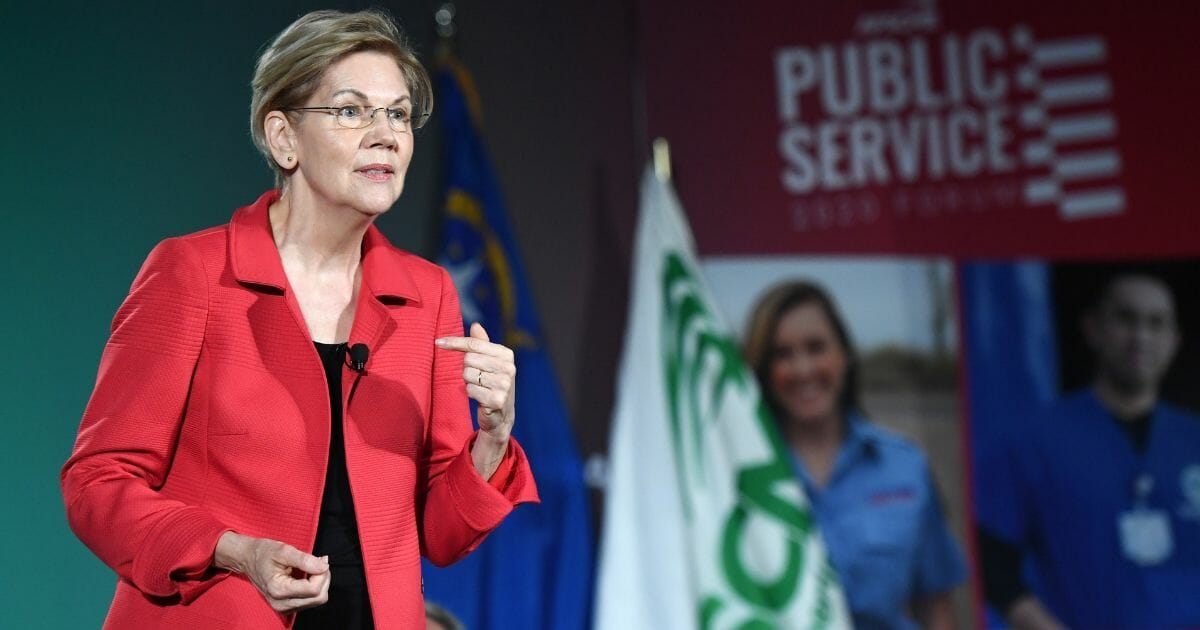
Elizabeth Warren Among 2020 Dems Set To Address Native American Forum in Sioux City
Democratic presidential candidates will descend on Iowa next week to do something that Native Americans say doesn’t happen enough: court their vote.
At least seven White House hopefuls have said they’ll attend a forum in Sioux City on Monday and Tuesday named for longtime Native American activist Frank LaMere, who died in June.
Tribal leaders and citizens will talk with candidates about issues including health care, education and violence against National American women.
Several candidates attending the forum, including Bernie Sanders, Elizabeth Warren, Julian Castro and Marianne Williamson, have issued platforms dedicated to the needs of indigenous people.
Marcella LeBeau, a 99-year-old registered Democrat and a citizen of the Two Kettles Band of the Lakota, said that’s a change from the past when politicians largely overlooked Native American issues.
“We’re like a third-world country,” she said. “No one really listens to us.”
Some Native Americans live in “hard-to-count” rural areas and are not reflected in the U.S. Census Bureau’s Current Population Survey, so the census cannot accurately measure their voter registration as it would for black, white, Asian and Hispanic citizens.
Census estimates say Native Americans make up around 1.7 percent — or 5.3 million — of the U.S. population, and suggest that more than 3.7 million Native Americans are of voting age.
If more Native Americans gain access to the polls, they may become a powerful asset for candidates. Richard Witmer, a political scientist from Creighton University who specializes in American Indian politics and policy, said the Native American vote can swing a close national election — though it should be noted that that claim could be made for literally any voting block of any size, if the election is close enough.
“The Native vote is absolutely going to matter. It’s going to matter a lot,” Witmer said of next year’s race.
Candidates rarely court the Native American vote like they do other demographics, noted Nicole Willis, a citizen of the Confederated Tribes of the Umatilla who lives in Seattle.
“It’s almost like a moral test of a candidate. Like, are you going to pay attention to this group that has traditionally been ignored?” said Willis, who was a Native American outreach adviser to President Barack Obama as well as a 2016 presidential adviser to Sanders.
Sen. Warren has had her own problems with the Native American community.
After President Donald Trump gave her the nickname “Pocahontas” for her claims of Cherokee citizenship, Warren took a DNA test to try to prove her ancestry. The test did provide some evidence of a Native American in Warren’s lineage — perhaps 10 generations back.
Worse for her, the Cherokee Nation complained that tribal nations, not DNA tests, determine citizenship, and that Warren was “undermining tribal interests with her continued claims of tribal heritage.”
Warren was forced to apologize and will likely face scrutiny at the forum over how she handles the issue.
Ahead of the event, New Mexico Rep. Deb Haaland, a citizen of the Laguna Pueblo and one of the first Native Americans in Congress, endorsed Warren for president. And Warren joined with Haaland on Friday to propose legislation that would cordon off funding for tribal priorities from Congress’ unpredictable appropriations process, fulfilling a recommendation the U.S. Commission on Civil Rights made last year.
Warren also proposed setting up a permanent White House office dedicated to tribal issues and backed more resources for aiding tribal land acquisition, among other ideas to help Native American communities.
Activists claim tribal citizens still face barriers to voting that must be addressed.
Some Native Americans live on far-flung reservations without polling centers, though that problem is not as large as it used to be. For example, four Directions, a group promoting voting rights for Native Americans, successfully sued for satellite offices on Nevada’s Pyramid Lake Paiute Tribe reservation in 2016, where residents had to drive nearly 100 miles roundtrip just to vote, said Oliver “O.J.” Semans, co-founder of the forum and a citizen of South Dakota’s Rosebud Sioux Tribe.
Activists also claim that voter ID requirements represent another hurdle. North Dakota, for example, requires voters to provide ID and a street address at the polls, so rural Natives with only a P.O. Box number have been barred from voting, Semans claimed.
Just this month, a federal appeals court ruled against members of North Dakota’s Turtle Mountain Band of Chippewa, who had said such requirements were unconstitutional, in part because the plaintiffs were unable to prove that any of the 4,998 Native and 64,628 non-Native voters lacking the required identification had even tried to obtain it.
The Native vote is likely to favor Democrats, who are often seen as more receptive toward the needs of Native American communities on issues like health care, tribal sovereignty and economic development, Witmer said.
Many indigenous people hold profound respect for their tribal elders and leaders, who can sway the vote of whole reservations, Semans said.
“Political parties have taken for granted how Natives turn out and vote,” Semans said. “Either pay attention to us or don’t count on us.”
The Western Journal has reviewed this Associated Press story and may have altered it prior to publication to ensure that it meets our editorial standards.
Truth and Accuracy
We are committed to truth and accuracy in all of our journalism. Read our editorial standards.
Advertise with The Western Journal and reach millions of highly engaged readers, while supporting our work. Advertise Today.











